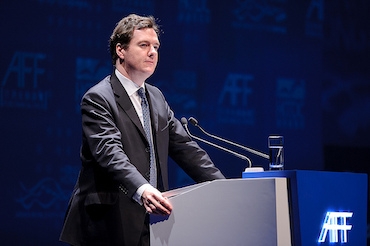
Flat-rate pensions tax relief 'devoid of economic rationale'

Introducing a flat-rate of pensions tax relief would be misguided and “devoid of any economic rationale”, the Institute of Economic Affairs has claimed.
The organisation believes such a change would involve “huge practical problems, unnecessary new complexity and inappropriate over-taxation of those on fluctuating incomes”.
Professor Philip Booth, academic and research director at the Institute of Economic Affairs, said: “Introducing a flat rate of pensions tax relief would be devoid of any economic rationale and prohibitively complex in practice. It would also necessitate further complex legislation to prevent anomalies arising.
“If the government wants to reform the taxation of pensions, it should abolish or severely restrict the tax-free lump sum. This would lead to significant simplification without the creation of perverse incentives.”
The institute has published a briefing following rumours that Chancellor George Osborne will use the forthcoming budget to replace tax relief on pension contributions at a taxpayer’s highest marginal tax rate - usually 40 or 45% for higher earners - with a so-called flat rate pension tax relief, perhaps at 30%.
Higher-rate taxpayers could end up effectively paying a ‘fine’ to make pension contributions, the organisation stated in its report.
Under a so-called flat-rate relief, higher-rate taxpayers could end up obtaining tax relief of 30% on a contribution used to buy a pension that is taxed at 40%, in effect people ‘fining’ people when they make pension contributions, it said.
The briefing stated: “It would be hugely detrimental to those with fluctuating incomes. The current system facilitates income smoothing so that the tax system comes closer to taxing individuals with the same lifetime income at the same rate.
“A flat-rate would eliminate one of the corrections that the current system of tax relief makes against the injustice of a progressive tax system – that those with highly fluctuating incomes tend to pay much more in tax across their lifetimes.
“The potential abuses would necessitate further complex legislation. A single rate of tax relief would necessitate hundreds more pages in the tax code to counteract potential loophole exploitation and to correct for incentives the new regimes creates.”
The institute also said that estimates of the cost of tax relief under the current system “hugely over-estimate the real cost”.
It said: “Those arguing for reform to pension tax relief misleadingly refer to the gross cost of tax relief. This implies that the counterfactual is a world in which pension contributions are made out of net income, and that pensions are taxed when received so that income tax would be charged twice on pension contributions. This is clearly a colossal overestimation of cost.”
While other “radical reforms may well be justified”, the institute said the government should abolish - or severely restrict - the tax-free lump sum.
If abolished or restricted to around £30,000, it would facilitate huge simplification of the tax system surrounding pensions, the briefing papers argued.
